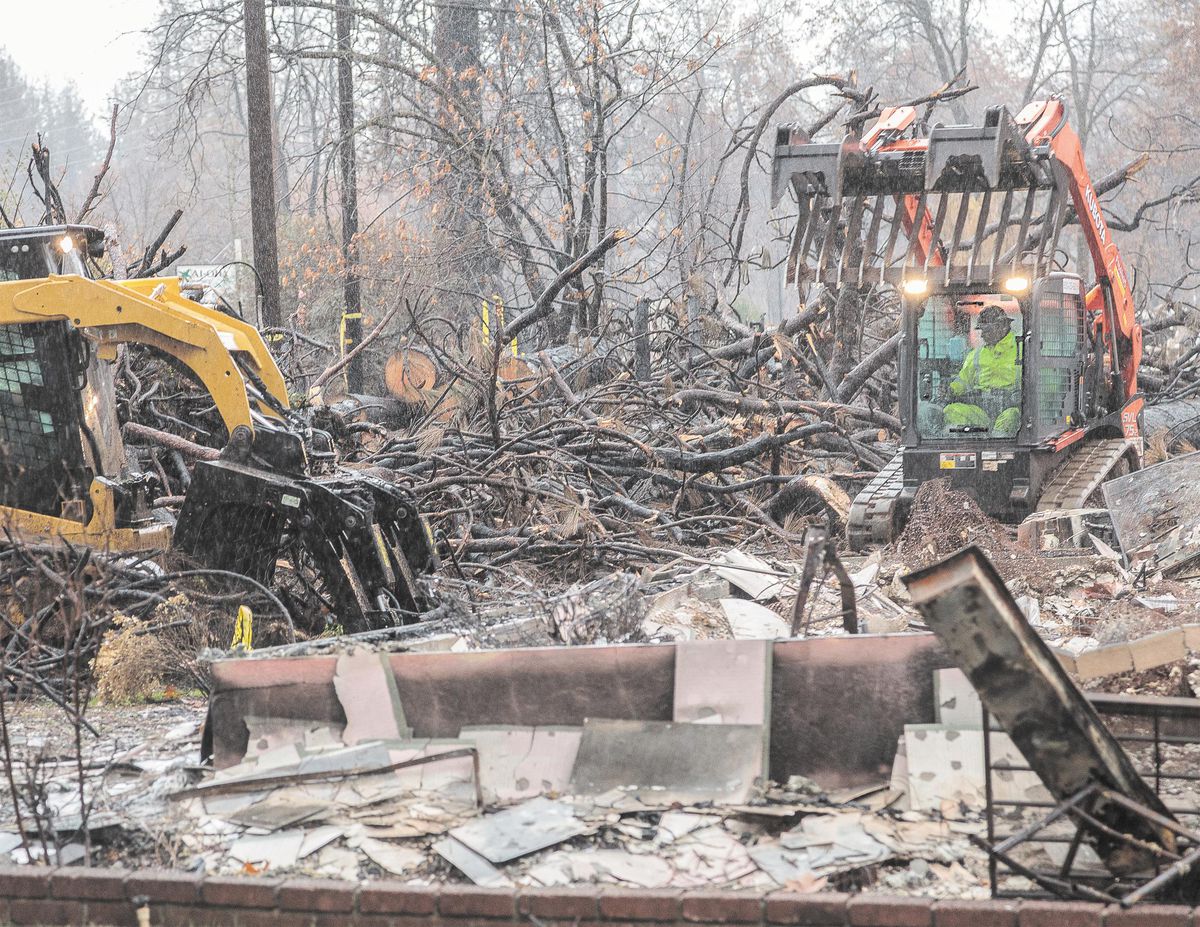
Photo by Charles finlay
Residents will no longer be able to live on properties with burned structures until they are cleared.
All the folks who’ve moved into trailers on their burned-out properties since the Camp Fire will very likely—and likely very soon—be told they must move. Again. It’s not a pleasant prospect, but the consequences could be dire.
“I hate to be the messenger on this after everything …,” County Chief Administrative Officer Shari McCracken informed the Board of Supervisors late in Tuesday’s regular meeting (Jan. 29). “FEMA has said we are not eligible as a county, nor is the town [of Paradise], for debris removal [money] if we allow people to live on properties with structural fire debris on it.”
A hush came over the room as audience members and supervisors alike exchanged looks of confusion. The board had just spent nearly two hours discussing a set of ordinances regarding emergency, short-term shelter. Public comments had been heard.
After two of those speakers questioned being denied temporary power permits in recent days, Supervisor Bill Connelly asked staff to explain. That’s when McCracken dropped the bombshell that quieted the room.
“FEMA, in re-evaluating our request for public assistance for debris removal, has determined that the town’s ordinance and the county’s ordinance could make us ineligible for the $1.7 billion in debris removal money,” she explained. “The only way FEMA can pay for debris removal is if there are imminent health risks. We negate saying it’s imminent if people are living there.”
The announcement made the public’s pleas earlier in the meeting for faster action more relevant and more urgent, prompting the board to shift gears before taking a vote to ease restrictions on ag land and types of structures that will be allowed.
The three ordinances being discussed had been passed in December as emergency measures. One dealt with debris removal requirements; the other two with temporary shelter, both inside and outside the Camp Fire area.
“Democracy is messy. Now it’s time to get a little messy,” Tim Snellings, director of community development, told the board by way of introduction. “There are a lot of balls in the air on this next item.”
The board was being asked to repeal the ordinances, consider some amendments, and codify them to make them easier for everyone to find in the future, Snellings explained. Among additions to consider allowing: manufactured homes and yurts as temporary dwellings within the Camp Fire area, and temporary RV parks on ag land. From the get-go, the board appeared apprehensive about all but the manufactured homes. This riled some in the audience.
“The previous ordinances actually didn’t do anything—there was no housing built,” said Jennifer Ellingson, president of Northstate Relief, a local church group. “They were nice, but not practical. I’m sitting back there getting panicked, thinking I’m going to have to go back to the 80 or so families I’m worried about and tell them they’re going to have to keep camping, staying with their neighbors.”
Ellingson’s concerns were repeated by half a dozen others in the room, all of whom said they were growing frustrated trying to find comfortable, semi-permanent housing for friends and family currently couch-surfing. “People can’t wait any longer,” she said.
“I’m now housing 12 RVs of Camp Fire survivors,” Kimberly Young told the panel. She lives on 10 acres in Durham and would like to be able to continue to provide the help, though she’s not zoned to do so. “They have become my family. But under the urgency ordinance, I am illegal—I’m only able to house two. If that isn’t changed, I’ll have to be telling my family they have to leave and be on the street.”
One of the survivors living on Young’s property is Bruce Lawrence, who implored the panel act more urgently to create temporary solutions for people like him.
“I’m a Camp Fire survivor, and also a retired fire captain from the Paradise Fire Department. I’m now living in a fifth-wheel on the Young property. It’s set up very well. We could go to Sacramento, but then we can’t be here to manage what we need to manage. Implement something to allow us to stay temporarily.
“This is unprecedented—a fire has never devastated a city like this and put so many people with nowhere to live.”
Yurts were another item of contention, if only because some of the supervisors found their definition to be too vague. In fact, despite freshman Supervisors Tami Ritter and Debra Lucero speaking in their favor, their mention drew chuckles from the dais.
“I understand the snickering during your conversation,” Lauren Kennedy told the board, “and not to be cliché, but this is no laughing matter. This housing option has been working for hundreds, or thousands, of years—there’s no reason not to consider them for Butte County.”
After public comment was closed and McCracken made her announcement, the board flipped on its head and requested staff come back with options for RV parks on ag land within the sphere of influence of local jurisdictions so as to be nearb services.
“We might have to switch priorities for our cleanup plan,” added Ritter. The panel had originally set the priority for areas with the most right-of-entry forms, but maybe the priority should be more rural areas like Yankee Hill or Concow, where a person could own 100 acres and not be able to live on it.
The board is due to come back next week for an emergency meeting.
In other news: The North Valley Community Foundation has earmarked $1 million of $3.25 million donated by Wells Fargo to help Camp Fire survivors remaining at the shelter. That help could be anything from new tires to hotel stays to money to help fund property cleanups. It will be vetted by the Butte County Department of Social Services.
